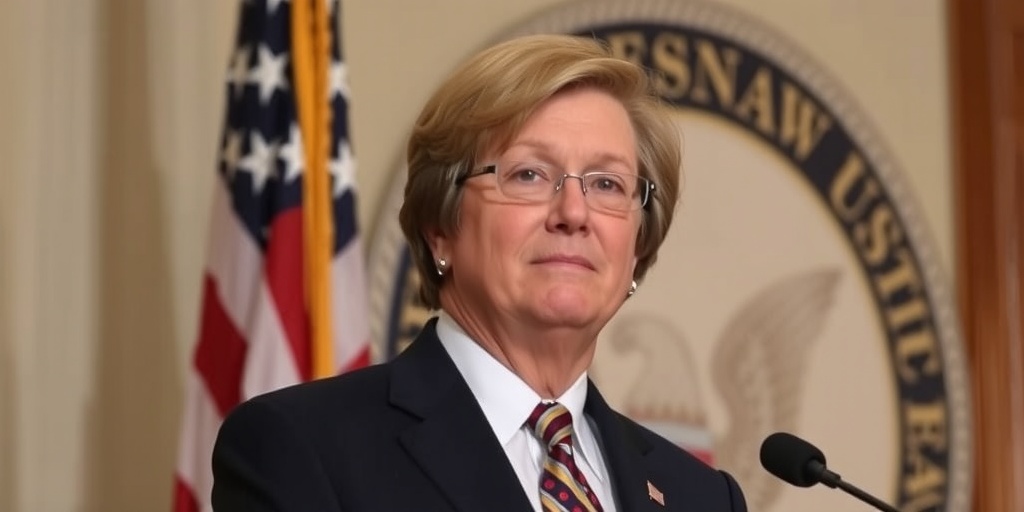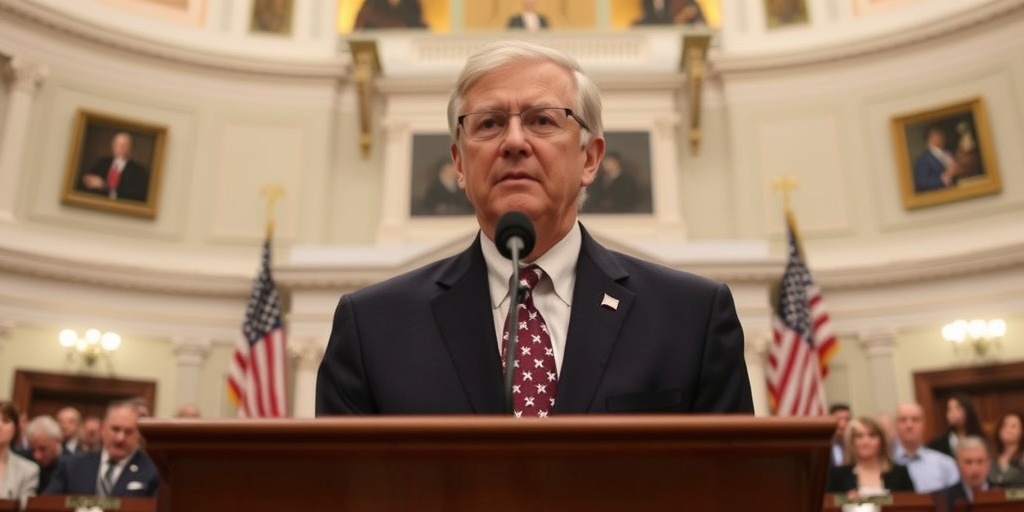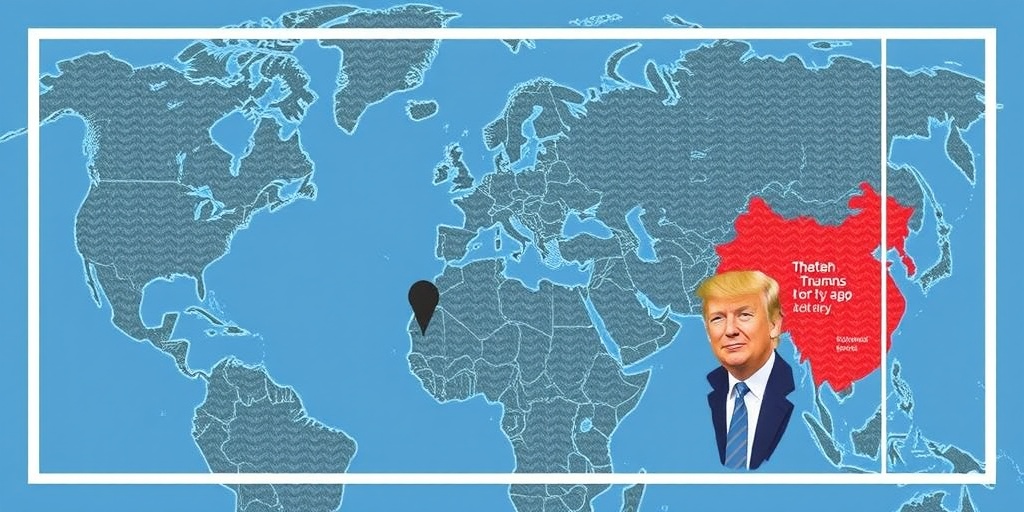Now Reading: Senate Confirms Gail Slater as Antitrust Chief at Justice Dept.
-
01
Senate Confirms Gail Slater as Antitrust Chief at Justice Dept.
Senate Confirms Gail Slater as Antitrust Chief at Justice Dept.

Senate Confirms Gail Slater as Head of Justice Department’s Antitrust Division Amid Ongoing Corporate Scrutiny
On Tuesday, the Senate overwhelmingly approved Gail Slater, a nominee put forth by President Trump, to lead the Justice Department’s antitrust division. The vote concluded with a significant majority, tallying 78 in favor and 19 against. Slater, a seasoned attorney specializing in tech and media law, takes the helm at a crucial time when corporate power is under heightened examination throughout the United States.
Slater’s confirmation signals a continued vigilance against monopolistic practices, particularly within the technology sector. In her confirmation hearing, she made it clear that she intends to remain skeptical of corporate influence across various industries. This commitment comes at a time when the landscape of corporate power, especially within tech, is increasingly concerning to regulators and consumers alike. It is noteworthy that during her testimony, Slater voiced apprehensions about the dominance and control some online platforms hold, stating that individuals can be “disappeared from the internet quite easily.” Her statements reflect a broader awareness of how digital platforms can impact free speech and accessibility online.
The implications of Slater’s appointment extend beyond her personal commitments; they signal a potential shift in the Justice Department’s approach to antitrust enforcement. Wall Street and Silicon Valley are closely monitoring this transition, particularly with regards to whether the Trump administration will carry on the rigorous scrutiny of corporate America that characterized the tenure of former President Joseph R. Biden Jr. Under Biden, the Justice Department, alongside the Federal Trade Commission, pursued an aggressive agenda against major tech companies, arguing that they wield excessive power in the marketplace.
As Slater steps into her new role, she inherits a complex landscape of ongoing antitrust litigation, notably two significant lawsuits against Google. The first of these lawsuits, filed in 2020 during Trump’s first term, became a landmark case after a federal judge ruled last year that Google holds monopoly power in the search engine market. This ruling has set a precedent for how large technology companies can be regulated. Meanwhile, a second case involving claims about Google’s dominance in ad technology is still pending, with the court deliberating on the government’s allegations of anticompetitive behavior.
In recent developments, the Justice Department has maintained its assertive position concerning the Google search case by demanding that the court compel Google to divest its widely used Chrome web browser. This appeal demonstrates a continuity in the aggressive regulatory stance that some advocates believe is necessary to rein in monopolistic practices within the tech industry. The judge overseeing this case is scheduled to hear arguments from both sides in April, and the outcome could shape the future of regulation in the digital marketplace.
In addition to the Google lawsuits, the Justice Department has also been active against Apple, filing a lawsuit last year alleging that the company’s tightly integrated ecosystem of devices and software creates substantial barriers for consumers looking to switch to other platforms. This lawsuit exemplifies the broader movement toward scrutinizing big tech companies to ensure fair competition and protect consumer rights.
Slater’s background positions her uniquely for this role. She has spent years navigating the intersections of technology, law, and policy in Washington. Notably, she previously served as a representative for the Internet Association, a now-defunct organization that advocated for some of the largest tech companies, including Google, Meta, and others. Additionally, Slater has worked closely with Vice President JD Vance during his time in the Senate and has held a position in the National Economic Council during Trump’s initial term. Her extensive experience in both the legal and political realms equips her with a nuanced understanding of the challenges and opportunities facing the antitrust division.
As Slater embarks on her new responsibilities, stakeholders across various sectors will be watching closely to see how her leadership will shape the future of antitrust regulation in the U.S. The evolving landscape of corporate power and the ongoing legal battles present both challenges and opportunities for her division. With the stakes so high, Slater’s approach to enforcement will be critical in determining how technology companies operate in an increasingly scrutinized environment.
In summary, Gail Slater’s confirmation as head of the Justice Department’s antitrust division represents a pivotal moment in the ongoing dialogue about corporate power, particularly in the tech sector. Her track record, combined with current legal challenges against major companies, positions her to potentially make significant impacts on how these entities are regulated moving forward. The coming months will likely reveal whether the antitrust division under Slater can redefine the balance between corporate influence and consumer protection in an ever-evolving digital landscape.
Stay Informed With the Latest & Most Important News
Previous Post
Next Post
-
 01New technology breakthrough has everyone talking right now
01New technology breakthrough has everyone talking right now -
 02Unbelievable life hack everyone needs to try today
02Unbelievable life hack everyone needs to try today -
 03Fascinating discovery found buried deep beneath the ocean
03Fascinating discovery found buried deep beneath the ocean -
 04Man invents genius device that solves everyday problems
04Man invents genius device that solves everyday problems -
 05Shocking discovery that changes what we know forever
05Shocking discovery that changes what we know forever -
 06Internet goes wild over celebrity’s unexpected fashion choice
06Internet goes wild over celebrity’s unexpected fashion choice -
 07Rare animal sighting stuns scientists and wildlife lovers
07Rare animal sighting stuns scientists and wildlife lovers





















